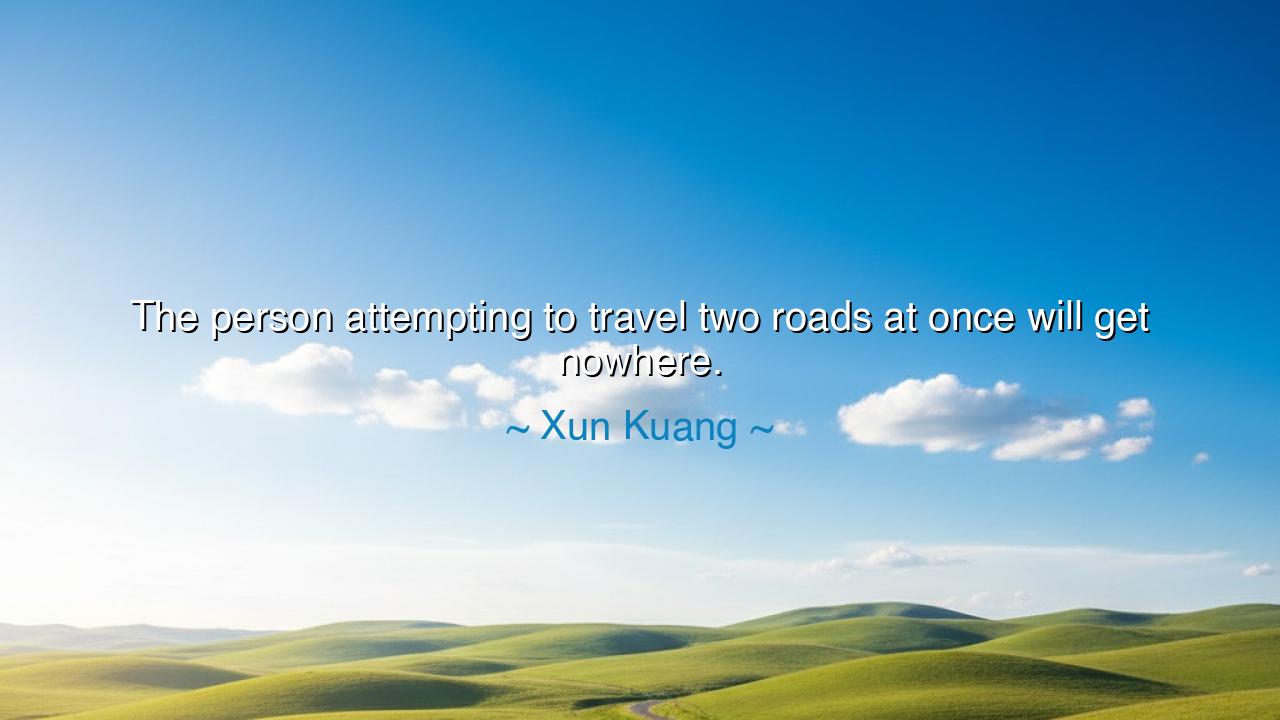
The person attempting to travel two roads at once will get






Xun Kuang, the sage of ancient China, spoke with the sharp clarity of timeless wisdom: “The person attempting to travel two roads at once will get nowhere.” Though centuries have passed, his words endure as a mirror to the human heart, for they reveal the futility of divided purpose. To attempt two paths at once is to split the will, to scatter the spirit, to dilute the strength that might otherwise conquer a single road. The lesson is simple yet fierce: indecision is paralysis, and the divided soul is defeated before the journey has even begun.
The roads in Xun Kuang’s saying are not merely of stone or soil; they are the paths of life itself—choices, commitments, destinies. One who hesitates, seeking to walk two paths at once, moves forward in neither. Like a river branching into two streams too small to flow, such a person lacks the power of direction. For life, unlike a dream, demands decision. One cannot serve two masters, chase two opposing desires, or live in two worlds. To attempt this is to waste energy in conflict rather than creation.
The ancients told this truth in parable and story. In Greek myth, Hercules stood at the crossroads where two women appeared before him: one offering the easy road of pleasure, the other the difficult road of virtue. He could not walk both. To choose one was to forsake the other. His greatness came not from delay, but from decision. Xun Kuang’s wisdom echoes this eternal law: the man who refuses to choose condemns himself to drift, for two diverging paths cannot be walked by one body.
History, too, bears testimony. Consider Napoleon, torn between the conquest of Europe and the invasion of Russia. Attempting both, he scattered his strength, and his empire crumbled. Or think of businesses that chase two opposite strategies at once—growth without cost, innovation without risk—only to collapse beneath the weight of contradiction. In every field, from politics to war to the most intimate corners of life, those who attempt two roads at once find themselves stranded.
The meaning of Xun Kuang’s saying is not to despise ambition, but to remind us that true progress requires focus. Better to walk one path with full strength than to stumble weakly on two. The human heart must choose its direction, for clarity is the engine of momentum. To know your way is to command your steps; to scatter your vision is to wander endlessly.
The lesson is bright as the morning sun: if you would succeed, choose. If you would grow, commit. Do not waste your years in hesitation, seeking to preserve every option, for in trying to have all, you lose all. The person who says “I will do both” often does neither; the one who says “This is my road” will find progress, even if the way is hard.
Practical action follows. When you face choice—of work, of love, of calling—examine both roads carefully, but then decide. Accept that every path chosen is also a path forsaken. Do not fear this loss, for it is the price of purpose. Once chosen, walk with steady steps. Do not glance constantly at the other path, for that way lies regret. Instead, pour your whole spirit into the road beneath your feet, and it will lead you to a place of fulfillment.
Thus Xun Kuang’s words, ancient yet alive, resound across the ages: “The person attempting to travel two roads at once will get nowhere.” Let us then live with courage, not hesitation. Let us choose, and in choosing, move forward. For the world belongs not to the divided, but to the decisive; not to the wanderer torn in two, but to the pilgrim who walks one road with all his heart.






AAdministratorAdministrator
Welcome, honored guests. Please leave a comment, we will respond soon